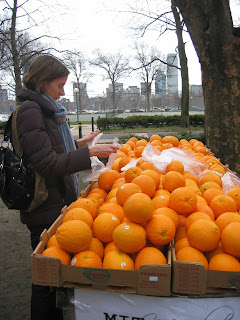The Boston Globe reported recently that the number of small farms in Massachusetts has increased dramatically, and the evidence is in the farmer's markets! There are so many new markets in the area that they are actually competing for farmers and their wares. In fact, such competition may lower prices at the markets for the consumer. The farmer's market is back on track - look at the wide literature for the reasons why - and ours in Davis Square is small but lively, and offers a wide variety of wonderful local foods.
After a year-round market in Berkeley, CA, we were saddened - but not surprised - to find that ours is open for less than half the year. Snow, ice, and the dark days of New England winter explain this, so it pays to take advantage of the market while it's here. While we belong to a CSA and don't need our farmer's market for everyday produce, I have found two fantastic sources of food there:
1) Seconds tomatoes. In Cali, we often made deals with the farmers to take home boxes of "seconds" tomatoes - those that may be bruised or over-ripe and perfect for sauce - for $0.50 a pound. Here I've found the farmers offer these tomatoes for quite a bit more ($1.00-1.50/pound), though I am far too wimpy to haggle...when I get these tomatoes home I skin them immediately by dousing them in boiling water with the stems removed, then I store them whole in the freezer for winter. We had tomato-based meals in the depths of winter last year that tasted like the happy days of summer.
Image from "Farmer Al's Seeds of Wisdom" published by Albert Stoddart
2) Honey from Farmer Al! Farmer Al, or Albert Stoddart the honey man, has a farm in South Lancaster where he makes his own honey. Last year he was the first farmer we met when we arrived in Massachusetts and he gave us free veggies as a welcome. Along with those veggies, he gave us his book Farmer Al's Seeds of Wisdom, which is based on - in his own words - his "own involvement and observation in the things of nature." Farmer Al tells us "to grow food for tomorrow takes a lot of faith in seeds" and "try as you may an apple tree will not provide an ear of corn." Should you want your own book of wisdom, visit Farmer Al!



















